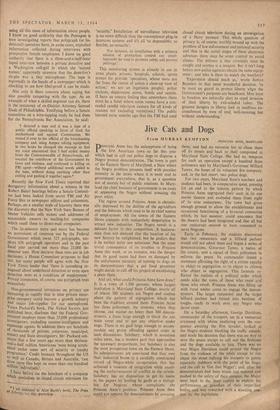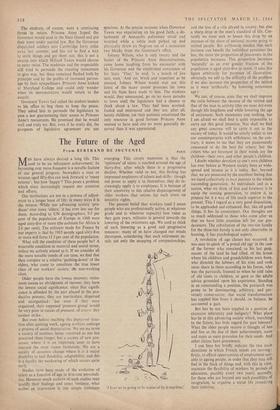Jive Cats and Dogs
From MURRAY KEMPTON
PRINCESS ANNE, MARYLAND
PRINCESS ANNE has the unhappiness of being the first_ American town so far this year which had to call out police dogs to disperse a Negro protest demonstration. The town is part of the Eastern Shore of Maryland, a State where the Negro problem presents itself with peculiar intensity in the terms where it is most real to government everywhere, that is, as a question not of morals but of public relations. In Mary- land the chief business of government is an essay at appeasing the Negro without arousing the poor white.
The region around Princess Anne is chronic- ally depressed by the decline of the agriculture and the fisheries which used to be its chief source of employment. All the towns of the Eastern Shore compete with melancholy desperation to attract new industries. The Negro revolt is a delicate factor in this competition. A business- man does not demand that the location of his new factory be enlightened, but he prefers that it be neither noisy nor notorious. Not the most trivial consequence of its troubles to Princess Anne this week, as an instance, was the danger that its good name had been so damaged by the unfortunate necessity of turning its dogs on its demonstrators that a pet food processor might decide to call off.his project of establishing a plant there.
And yet, what could Princess Anne have done? It is a town of 1,500 persons, whose largest institution is Maryland State College, nearly all of whose 500 students are Negro , and restless about the pattern of segregation which has been the tradition around them. Princess Anne has three policemen; the students, when they choose, can muster no fewer than 300 demon- strators, a force large enough to block the one main street and to put any objective under siege. There is no gaol large enough to accom- modate any group offending against order in such dimensions. Salisbury, which is seventeen miles away, has a modern gaol that approaches the necessary proportions; but Salisbury is also the most prosperous town on the Eastern Shore. Its administrators are convinced that they owe their industrial boom to a carefully constructed record of Negro-white co-operation that has achieved a measure of integration while avoid- ing the embarrassment of conflict in the streets. Salisbury has no disposition to get its name in the papers by lending its gaols as a storage bin for Negroes whose . complaints a'te Princess Anne's problem. Princess Anne then could not remove the demonstrators by arresting them, and had no recourse but to chase them off its streets and back to their compound at Maryland State College. She had no weapons for such an operation except a hundred State policemen sent by Maryland's Governor Millard Tawes, the hoses of its volunteer fire company, and, in the last resort, two police dogs.
For two years, Maryland State's teachers and students had been, in comparative quiet, pressing for an end to the historic pattern by which Princess Anne segregated their seats in its one movie theatre and excluded them from eight of its nine restaurants. The town had given enough ground to allow the establishment and occasional functioning of a bi-racial committee which, by last summer, could announce that the theatre had been integrated and that all but one restaurant seemed to have consented to serve Negroes.
Early in February, the students discovered that two restaurants and a billiard parlour would still not admit them and began a series of demonstrations. Governor Tawes, a native of the county, sent a squad of State policemen to enforce the peace. Its commander issued a statement affirming the right of a citizen equally to object to segregation or to object to citizens who object to segregation. This formula re- flected the realism of a political order which needs alike the votes of those who resist and those who. revolt. Princess Anne was filling up with rural whites come to engage the demon- strators. The target restaurant and the target billiard parlour had turned into bastions of toughs ready to work over any Negro who dared enter.
On a Saturday afternoon, George Davidson, commander of the troopers, sat in a restaurant crammed with whites muttering over the ven- geance awaiting the first invader, looked at the Negro students blocking the traffic outside, and made his decision that there was no way to save the peace except to call out the firehoses and the dogs available to him. There was no way Major Davidson could protect the Negro from the violence of the whitb except to run about the street rallying his troopers to points especially stubborn with the point of his finger and the call to 'Get that Nigger'; and, after the demonstrators had been bitten and watered and pushed to the safety of their campus, the Major went back to the State capital to explain his performance as guardian of their imperilled bodies and was rewarded with a standing ova- tion by the legislature. The students, of course, were a continuing threat to return. Princess Anne hoped the Governor would send in the State Guard and put their town 'under martial law. But the Governor dispatched soldiers into Cambridge forty miles away last summer, and has yet to find a way to settle things and get them out; this is not a swamp into which Millard Tawes would choose to enter twice. The moderate and the respectable still tried to persuade the resisting restaurants to give way, but these remained flushed both by principle and by the profits of increased patron- age by their sympathisers. Princess Anne looked at Maryland College and could only wonder when its demonstrators would return to the assault.
Governor Tawes had called the student leaders to his office to beg them to keep the peace. They asked him to persuade the legislature to pass a law guaranteeing their access to Princess Anne's restaurants. He promised that he would well and truly try. But, even if he really did, the prospects of legislative agreement are not spacious. At the precise moment when Governor Tawes was expatiating on his good faith, a de- tachment of Annapolis policemen stood and watched while a white mob picked up and physically threw six Negroes out of a restaurant two blocks from the Governor's office.
Johnny Wilson, who is only twenty and the leader of the Princess Anne demonstrations, came home laughing from his encounter with his Governor and the established conscience of his State. 'That,' he said, 'is a bunch of jive cats, man.' And yet, brash and impatient as he seemed, Johnny Wilson would wait out this latest of the many unmet promises his town and his State have made to him. The students would, they announced, go on no more parades to town until the legislature had a chance to think about a law. They had been scorned, fooled and mistreated and they are, after. all, barely children; yet their patience constituted the only resource in good fortune Princess Anne seemed to have and one no more generally de- served than it was appreciated.



































 Previous page
Previous page